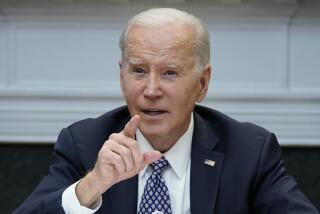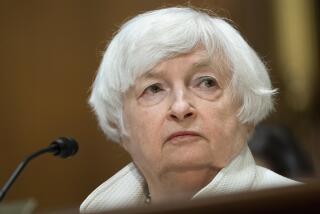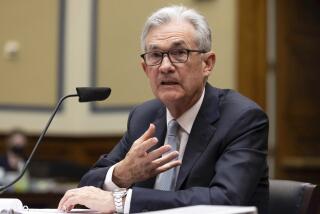Greenspan Gives Sunny Appraisal of U.S. Economy
- Share via
WASHINGTON — Federal Reserve Board Chairman Alan Greenspan said Friday that the U.S. economy is picking up steam again after a spring slowdown, and he expressed confidence that the noisy budget dispute between the White House and Congress will lead to genuine progress in reducing the federal deficit.
Responding to questions from the Senate Banking Committee just days before Fed officials will decide whether another change in interest rates is warranted, Greenspan said he sees no pressures on the economy that would justify immediate action.
Despite increasingly inflammatory rhetoric in the budget battle on Capitol Hill, Greenspan said he is convinced the White House and Congress will overcome their differences and move the government in the direction of a balanced budget.
“I have more optimism at this particular point about actually pulling this off . . . than I have for as long as I can remember,” Greenspan said.
The Fed chief’s upbeat testimony followed a renewed threat by House Speaker Newt Gingrich (R-Ga.) to send the United States into default on its debt if the Clinton Administration and Congress cannot come to terms on tax and spending priorities.
Greenspan rebuffed attempts by Democratic senators to elicit a condemnation of Gingrich’s comments or a dire prediction about their potential impact on the economy.
“I clearly expect that we will resolve the issues . . . without going into default,” Greenspan said. “It is very easy to get caught up in the level of the heated rhetoric that is currently going on. But that’s a symptom that something real is happening.”
He said the perception is spreading worldwide that the White House and Congress are genuinely committed to ending decades of deficit spending, a development that is contributing to the strengthening economy.
Both President Clinton and the Republican-controlled Congress have committed themselves to balancing the federal budget over the next several years, although their approaches are different and Congress is determined to do so at a faster pace.
“Long-term interest rates have fallen a great deal this year, in part because of the growing probability that a credible, multiyear deficit-reduction plan will be adopted,” Greenspan said. The decline in interest rates, in turn, has helped stimulate domestic spending, which acts as a “shock absorber” for the economy.
To flinch now, after raising global expectations, he warned, would be costly.
“Failure to take such action would signal that the United States is not capable of putting its fiscal house in order, with adverse and serious consequences for financial markets and long-term growth,” he told the senators.
Banking Committee Chairman Alfonse D’Amato (R-N.Y.) commended Greenspan for being more outspoken than he has been previously about the positive economic consequences of moving toward a balanced budget.
The Fed chief, whose comments to Congress often tend to be guarded, was unambiguous in describing positive developments in the economy. Both the risk of inflation and the threat of severe recession have receded significantly, he said.
He cited modest increases in business payrolls and declining unemployment as signals of the upturn.
“But the outlook is not without concern,” Greenspan noted. Potential problems include stockpiling of inventories and relatively sluggish recoveries in other countries.
The nation’s financial markets interpreted Greenspan’s sunny assessment of U.S. economic growth as a clear indication that the Fed’s key policy-setting committee is unlikely to reduce interest rates when it meets Tuesday. At one point Friday, the Dow Jones industrial average was down 38 points, but it recovered by the end of the day to close down 3.25 at 4,764.15.
More to Read
Get the L.A. Times Politics newsletter
Deeply reported insights into legislation, politics and policy from Sacramento, Washington and beyond. In your inbox twice per week.
You may occasionally receive promotional content from the Los Angeles Times.










